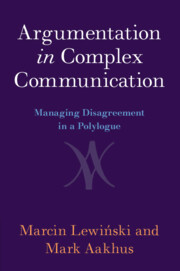Book contents
- Argumentation in Complex Communication
- Argumentation in Complex Communication
- Copyright page
- Contents
- Figures
- Preface
- Part I Seeking, Seeing, and Embracing Polylogue
- Part II Analyzing, Evaluating, and Designing Polylogue
- Chapter 5 Descriptive Analysis of Polylogues
- Chapter 6 Normative Evaluation of Polylogues
- Chapter 7 Prescriptive Design of Polylogues
- Chapter 8 Conclusion
- References
- Index
Chapter 7 - Prescriptive Design of Polylogues
from Part II - Analyzing, Evaluating, and Designing Polylogue
Published online by Cambridge University Press: 22 February 2023
- Argumentation in Complex Communication
- Argumentation in Complex Communication
- Copyright page
- Contents
- Figures
- Preface
- Part I Seeking, Seeing, and Embracing Polylogue
- Part II Analyzing, Evaluating, and Designing Polylogue
- Chapter 5 Descriptive Analysis of Polylogues
- Chapter 6 Normative Evaluation of Polylogues
- Chapter 7 Prescriptive Design of Polylogues
- Chapter 8 Conclusion
- References
- Index
Summary
This chapter recasts prescription in terms of design. Prescription has been of long-standing interest in logic, rhetoric, and dialectic. However, prescription is often narrowly cast such that it misses how context for argumentation is deliberately constructed. It is argued here that there can be design for argumentative polylogue that is more deliberate than the routine inventiveness evident in ordinary communication. This design work is not simply about particular inventions-for and discoveries-about positions, players, and places for argument but about assembling polylogues to produce particular argumentative discourse. Social media platforms are critically engaged to explore this point and to consider more generally the practical design theorizing involved in constructing argumentative polylogues. Argumentative design is shown to be best understood as an architectonic productive art for producing argumentative discourse that experiments with what is possible, plausible, probable, and preferable for disagreement management. It is work that is organized by a fundamental design question: what disagreement(s) to have (if any)? To further understand the designability of polylogical interaction for argumentative conduct, and the contestability of its design, additional contemporary cases in policy, deliberative democracy, and critical infrastructures are used to articulate communicative imagination, design languages, and critical thinking for polylogical argumentative design.
Keywords
- Type
- Chapter
- Information
- Argumentation in Complex CommunicationManaging Disagreement in a Polylogue, pp. 198 - 232Publisher: Cambridge University PressPrint publication year: 2022

